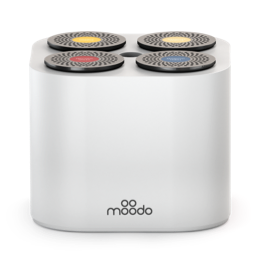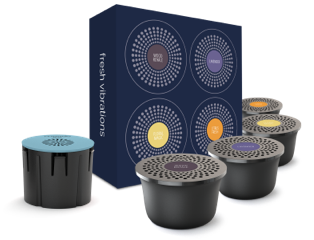Our mental state is influenced and often dominated by olfactory experiences that guide our senses. Whether it is an apple that looks rotten or a rose that seems freshly watered, behind the scenes it’s our sense of smell that’s responsible for much of those sensations. Indeed, we often sense the smell before the aroma molecules even make it to our nostrils, thanks to the fact that our vision tends to automatically relate images to smells and vice versa. This happens subconsciously and rapidly, thanks to our biological survival instinct. But what is smell, really? And can it be separated from our other senses?
How do we detect scents?
When we sniff, odor molecules are drawn in through the olfactory cleft inside our nose. The molecules then dissolve, and penetrate through the mucus membrane which is also known as the olfactory epithelium. Bony cushions, or turbinate’s, located inside the nose assist the intake of air which contains the odor molecules in our environment, directing and filtering the flow of air.
The cilia, hair-like projections attached to receptor cells, bind with the now-dissolved odor molecules and generate an impulse which travels through the olfactory nerves until it reaches the olfactory bulb in our brain. There, the signals are processed and passed on to other parts of the brain.
How does scent affect the brain?
To understand the connection between scent and emotion, we first need to mention an interesting and crucial region in our brain, called the hippocampus. The hippocampus, part of a network called the limbic system and one of the most studied parts of the brain, is associated with the processes of feelings and reacting. The hippocampus also stores two types of memory: declarative and spatial. The former is related to facts and events and the latter to pathways and routes.
The hippocampus is also where short-term memories turn into long-term memories. Since smell processing is also closely related to the hippocampus, scents and emotions are tightly intertwined. Our sense of smell is constantly taking us somewhere. As we journey in and out of memories and along with them, it invokes a range of emotions that tie to our present situation in either clear or very subtle ways.
Why do scents trigger emotion?
Memories are always intertwined with emotions. For example, when you reminisce about a vacation you often remember the joy of freedom. Memories are often associated with automatic emotions. Therefore, when we experience a scent which is stored in our memory, our brain tends to correlate it with certain recollections and the emotions involved with them emerge in tandem. To illustrate, consider a childhood memory that involves the smell of fresh baked cookies. This scent may remind you of afternoons spent with your grandparents many years back, while for someone else it can invoke memories of a very specific bakery, depending on the interaction between the scent and our own unique memories.
Do different smells affect your mood?
The way our brain receives and processes odors is complex and much of it still remains to be discovered. But there is no doubt that scent affects our mood. Most people who walk into a room that smells of jasmine, vanilla or lavender, are likely to improve their mood. However, if the room smells of garbage which has not been tossed out for a couple of weeks, most of us will feel quite the opposite.
Indeed, smells can affect both our short and long term moods. Creating an environment with pleasant smells which evoke positive, calm or otherwise good emotions is rather simple and can have a profound impact on our mood. Evidence to that is the increasing use of aroma diffusers created and customized to ensure a good scent in our environment
How are scents used in everyday life?
Scents are used in everyday life to elicit emotional responses. Take advertising and sales for example. Have you ever noticed a distinctive smell when walking into a store? Scents can be associated with the product, or be used to keep customers around. Research shows that providing a pleasant-smelling environment can lead to increased sales, and many stores employ scent machines for these exact purposes.
Similarly, scents and aromas can also be used in classroom settings or in the workplace. Studies show that certain smells can influence parts of the brain that are responsible for productivity. School teachers use fragrance diffusers in the classroom, occasionally associated with different subjects, to stimulate brain activity and calm rowdy children. The same can be seen in the workplace. Placing an aroma diffuser in the office can improve employees’ mood and productivity, and contribute to an all-around happier work environment.
Why do certain smells instantly evoke specific memories or feelings?
Smell is our most sensitive sense and the one most strongly linked to our memory and feelings. Our olfactory bulb, which begins inside the nose and runs along the bottom of the brain, is the first stop for new smells. This bulb is directly linked to two areas of the brain that govern emotion and memory: the amygdala and hippocampus. Scientists believe that our sense of smell triggers memory more than other senses because those senses do not pass through these areas of the brain. Memories that are triggered by our olfactory senses can be accompanied by clear images and feelings of happiness, excitement, agony, and despair.
Start smelling
Unlock all your olfactory senses with the right scent machine.
smart aroma diffusers can be the key to unlocking your desired moods at home, in the office, or while studying for an important exam. Moodo is a smart aroma diffuser that allows you to experience the right scent, in the right place, at the right time. Controlled by a smartphone or other Wi-Fi-enabled smart devices, Moodo offers different aromatic experiences in “scent families” that are just the right scent, when you need it most.










Moodo in the press
Moodo Smart Home Fragrance Box Review: Aroma Therapy For The Modern Age.
14 Innovative Startups That Prove We are Living in the Sci-fi Future
Moodo makes some great scent pods that provide unique and well-balanced aroma.
Moodo enables you to customize your scentscapes to match your mood.
“Moodo Review: Smart Scent Diffuser Works Its Magic”
79 Urban Outfitters Gadgets You Had No Idea You Needed but Now Can’t Live Without..
Fragrances Abound Through The Home Because of the Moodo Smart Aroma Diffuser
The 10 Best Smart Home Devices of IFA 2018
“The Coolest New Tech and Gadgets to Buy in 2018”
IFTTT is gaining steam as a viable way to connect smart devices…
50 New Smart Home Products That Caught Our Eye
The Best Tech Gifts to Give This Holiday Season
“Control the Way Your Home Smells From Your iPhone.”
“11 Techie Holiday Gifts for Early Adopters”
“Set the Mood with Moodo: the Next Big Smart Home Device?”